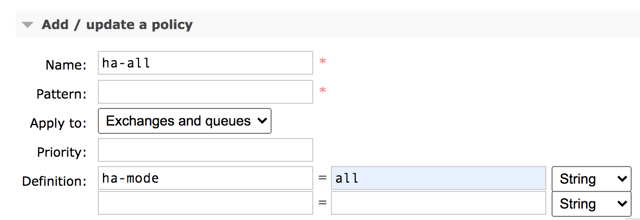Policy CAN be specified in a definition file, which can be referred to from your config file.
Example of how I have set a specific policy (not sure if ha can be specified in policy):
/etc/rabbitmq/rabbitmq.config
[
{rabbit,
[{vm_memory_high_watermark, 0.8}]
},
{rabbitmq_management,
[{listener, [{port, 15672}]},
{load_definitions, "/etc/rabbitmq/rabbitmq_definitions.json"},
{http_log_dir, "/var/log/rabbitmq/management_http.log"}]
}
].
/etc/rabbitmq/rabbitmq_definitions.json
{ "users":[
{"name":"rabbot","password_hash":"Cvse5iGOg20UqUq7Za9D1tatOJnMVDru4GHtxqc02g7zj5ur","tags":""},
{"name":"rabnet","password_hash":"CqqG2fwvH6xz64NpibGJx2M7ZCyFnR1BQBM+C0KH2qRPmVxF","tags":"administrator"}],
"vhosts":[
{"name":"/"}],
"permissions":[
{"user":"viabot","vhost":"VIA","configure":".*","write":".*","read":".*"},
{"user":"vianet","vhost":"VIA","configure":".*","write":".*","read":".*"}],
"parameters":[],
"policies":[
{"vhost":"VIA","name":"DLX","pattern":".*","apply-to":"queues","definition":{"dead-letter-exchange":"dead_letter"},"priority":0}
],
"queues":[
{"name":"store_to_es","vhost":"VIA","durable":true,"auto_delete":false,"arguments":{}},
{"name":"store_to_mongodb","vhost":"VIA","durable":true,"auto_delete":false,"arguments":{}}
],
"exchanges":[
{"name":"data_incoming","vhost":"VIA","type":"fanout","durable":true,"auto_delete":false,"internal":false,"arguments":{}},
{"name":"sms_incoming","vhost":"VIA","type":"fanout","durable":true,"auto_delete":false,"internal":false,"arguments":{}}
],
"bindings":[
{"source":"data_incoming","vhost":"VIA","destination":"store_to_es","destination_type":"queue","routing_key":"","arguments":{}},
{"source":"sms_incoming","vhost":"VIA","destination":"store_to_mongodb","destination_type":"queue","routing_key":"","arguments":{}}
]
}
I am sharing this config file and definitions file as it was impossible to figure it out from the RabbitMQ web site.
Note: This config worked on RabbitMQ 3.6.1 running on Ubuntu 14.04


